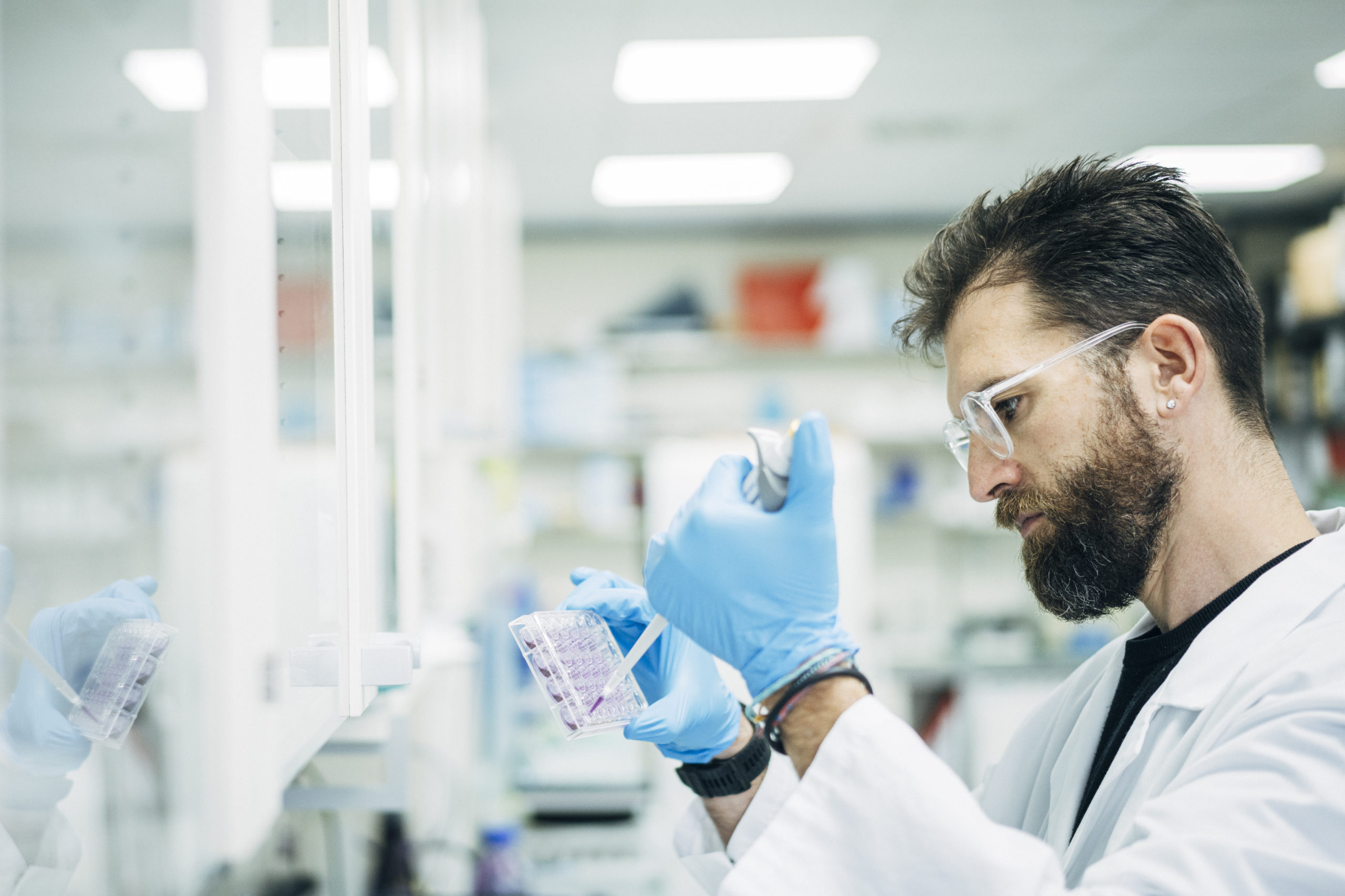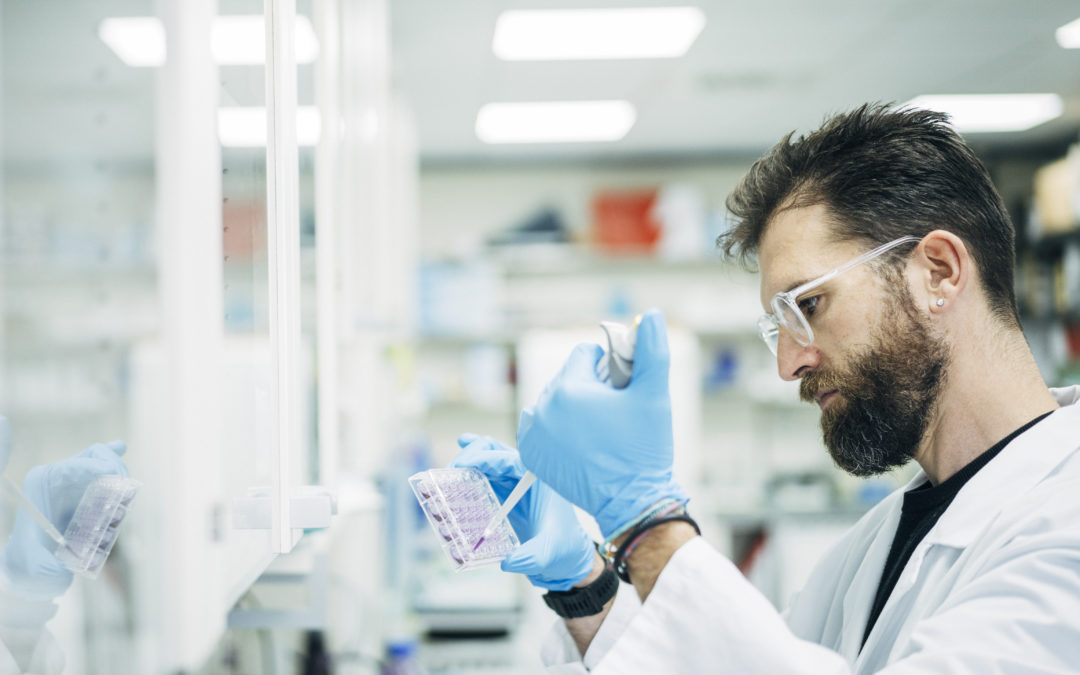
Since 2003, and with a moustache as its logo, Movember has called upon the international community to raise awareness about the most common men’s health issues. These include prostate cancer, the most common cancer in men.
In June of this year, the Fundación Occident Research Awards recognised the work of Arkaitz Carracedo, Ikerbasque Research Professor at the Centro de Investigación Cooperativa en Biosciences (CIC bioGUNE), in cancer study. Near Bilbao, Arkaitz directs a laboratory pioneering in the study of a molecular approach to the treatment of prostate cancer. On a sunny Movember day, we talked to him to learn more about this disease and what the most cutting-edge science can offer in the fight against prostate cancer, the most common cancer in men in Spain in 2021.
What made you take an interest in prostate cancer?
As a researcher, I have always wanted to understand the molecular basis of cancer. I think that studying cancer is also a way of understanding how life works, as well as making a very important social and scientific contribution.
Two factors in particular sparked my interest in this type of cancer. Firstly, I met my great teacher and mentor, Guillermo Velasco while I was studying at the Complutense University. Secondly, I discovered my passion and drive to find a cure for prostate cancer after meeting Doctors Miguel Unda and Ana Loizaga, who are both urologists at Basurto Hospital. People are catalysts for ideas, so any major initiative requires this personal component. After 12 years of collaboration, our projects at the Basurto Hospital urology service are even more ambitious and dedicated than ever. We also have the opportunity to do translational research, to see how the results of my research directly benefit patients in hospital, and at the same time, to receive new questions about research from the clinical area.
Do we know the main cause of prostate cancer?
The chances of developing prostate cancer increase with age, although there are other factors where less research has been carried out, such as genetic factors or lifestyle habits. Some groups of patients have a radically more aggressive type of prostate cancer, which has already metastasised when diagnosed. This represents only 5% of diagnoses in prostate cancer, but if we can decipher why this type of prostate cancer is more aggressive, we will be able to understand the conditions that determine the development of a tumour.
How common is prostate cancer?
It is one of the most common cancers affecting males but, thanks to the many successful treatments, survival rates have increased remarkably in the last 30 years. The challenge now is to understand why some patients who receive first-line treatment are not cured. To reduce these cases, molecular diagnosis provides information on the tumour diagnosed, and allows us to predict whether this person will need other treatment options.
What progress have you made from the CIC bioGUNE?
We have managed to put important pieces together in this highly complex puzzle, as is cancer. From our perspective of molecular typing of the disease, we have identified requirements of tumour cells that can be clinically exploited for diagnostic and/or therapeutic purposes. These lines of research have led us to update the composition of our laboratory, to include areas such as bioinformatics. Our team is multidisciplinary with a multifactorial perspective of the disease, which us to give a more in-depth and more complex response to cancer. This has allowed us to better understand the molecular basis of the disease.
What is the difference between a healthy cell and a tumour?
Tumour cells are like caged animals that are constantly fighting to escape. They have forgotten about their functions in our body, and their only objective is to survive and spread. To do this, they hijack processes used by healthy cells. Within these mechanisms, we study how they copy the feeding patterns of normal cells. The fuelling of cancerous cells is radically different to the feeding mechanisms of normal cells, as they use nutrients, as well as for energy, to create new cells. They also boost other areas of the metabolism, such as the production of molecules called polyamines. Our research has, in fact, focused on two questions with regard to this molecule: What makes a tumour cell capable of increasing the production of polyamines?; and What do polyamines do to help the survival and growth of a tumour cell?
What are polyamines?
Polyamines are organic compounds produced by our cells, but which can also be obtained from diet. These compounds facilitate in the growth, division and proliferation of cancer cells. They are like engine oil for a tumour. We are researching whether they can be a target for slowing down the growth of the tumour without affecting normal cells.
So, are polyamines, in general, harmful to the health, and should we avoid consuming products that contain them?
No. It’s not that simple. While tumour cells use polyamines to proliferate, other organs use them to promote a healthier state. For example, we have seen that in the context of obesity, promoting the production of polyamines contributes to better fat management to reduce adiposity. So we are in a paradox in which we have to balance their beneficial effects and, at the same time, limit their effects on cancer cells.
Can we control the effects of polyamines through diet?
In the case of obesity, it has been proposed that altering the amount of polyamines in our diet can help to boost its beneficial effects. We are still at the early stages and more studies are required before we can be certain of the effectiveness of this approach. And, in the case of cancer, before we can consider the effects of diet, we first need more understanding of the role of polyamines in tumour growth.
What does the Fundación Occident Research Award mean for your research?
More than anything, recognition for myself and my team. And this prize will also allow us to continue researching this molecular basis. We plan to research further the early effects of polyamines on aggressive prostate cancer. We will test drugs to see their effects and what concentration is required to provoke changes the metabolism of polyamines. This way we can refine its use and adapt it to the conditions most beneficial for health.
And, in your opinion, can we “Feed health with the right nutrition”?
Without a doubt. Feeding your health is raising awareness of the importance of a balanced and healthy diet. There are no cancer-fighting superfoods or cancer-causing foods, so we need to aim for sustainable normality in our nutrition. Nowadays, eating well often seems to be a chore, rather than a pillar of health.
And feeding our health also means more research to understand it better, at an individual level and, based on our health, which foods are good for us. And also how to use the knowledge we generate in metabolism research to inspire the development of drugs.

